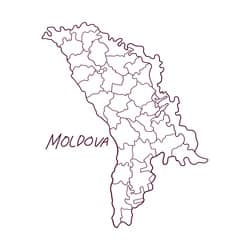Republic of Moldova

Moldova, officially known as the Republic of Moldova, is a landlocked nation located in Eastern Europe, situated on the northeastern corner of the Balkans. Covering a total area of 33,483 square kilometers (13,067 square miles), Moldova is home to a population of approximately 2.5 million people as of January 2023. It shares its borders with Romania to the west and Ukraine to the north, east, and south. The region known as Transnistria, an unrecognized breakaway state, lies on the eastern side of the Dniester river along Moldova’s border with Ukraine. Moldova operates as a unitary parliamentary representative democratic republic, with its capital in Chișinău, which is also the country’s largest city and a vital cultural and commercial hub.
History of the Republic of Moldova
Historically, a significant portion of Moldova’s territory was part of the Principality of Moldavia from the 14th century until 1812 when it was relinquished to the Russian Empire by the Ottoman Empire, subsequently becoming known as Bessarabia. In 1856, southern Bessarabia returned to Moldavia, which later united with Wallachia in 1859 to form Romania. However, Russian rule was restored over the entire region in 1878. During the 1917 Russian Revolution, Bessarabia briefly gained autonomy within the Russian Republic. In 1918, it declared independence and later joined Romania following a vote. Nevertheless, this decision was disputed by Soviet Russia, leading to the establishment of a Moldavian autonomous republic within the Ukrainian SSR in 1924.
The year 1940 brought the Molotov-Ribbentrop Pact, which forced Romania to cede Bessarabia and Northern Bukovina to the Soviet Union, resulting in the formation of the Moldavian Soviet Socialist Republic (Moldavian SSR). On 27 August 1991, amid the dissolution of the Soviet Union, the Moldavian SSR declared independence and adopted the name Moldova. However, the region east of the Dniester River has remained under the de facto control of the breakaway Transnistrian government since 1990. Moldova established its constitution in 1994, transforming into a parliamentary republic with a president as the head of state and a prime minister as the head of government.
Under President Maia Sandu, elected in 2020 on a pro-Western and anti-corruption platform, Moldova has actively sought European Union membership. In June 2022, Moldova was granted candidate status for EU membership. Sandu has also proposed reevaluating Moldova’s constitutional commitment to military neutrality in favor of closer ties with NATO. She has strongly condemned Russia’s invasion of neighboring Ukraine.
Moldova holds the distinction of being the second poorest country in Europe in terms of GDP per capita, trailing only Ukraine. The country’s economy is heavily influenced by the service sector. With a relatively low Human Development Index, Moldova ranks 76th globally as of 2022. It also stands at the 56th position on the Global Innovation Index for the same year. Moldova is an active member of various international organizations, including the United Nations, the Council of Europe, the World Trade Organization, and the Organization for Security and Cooperation in Europe, among others.
Observer Voice is the one stop site for National, International news, Sports, Editor’s Choice, Art/culture contents, Quotes and much more. We also cover historical contents. Historical contents includes World History, Indian History, and what happened today. The website also covers Entertainment across the India and World.
Follow Us on Twitter, Instagram, Facebook, & LinkedIn

